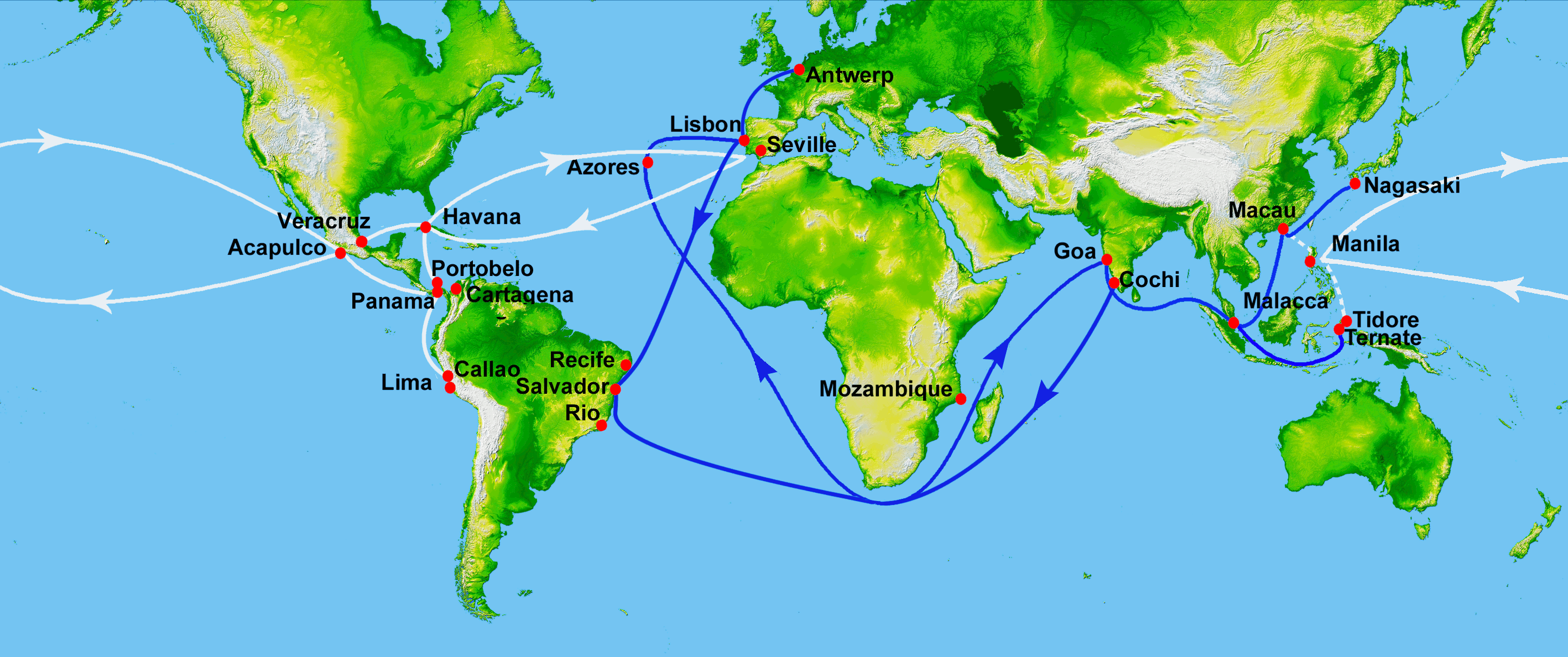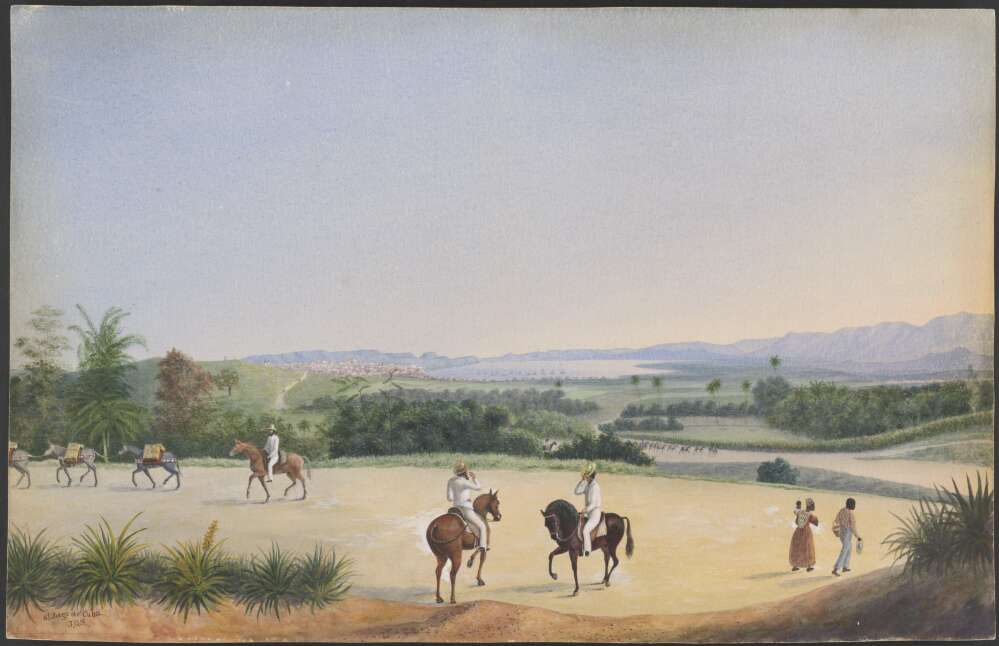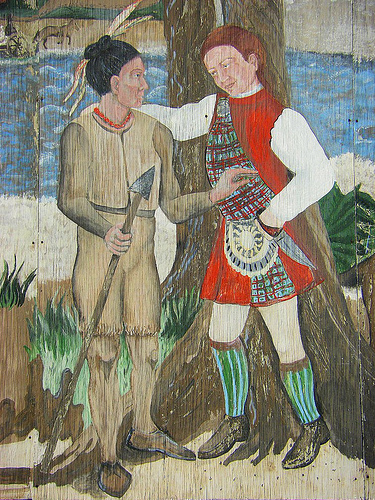|
Juan Menéndez Márquez
Juan Menéndez Márquez y Valdés (1531–1627) was royal treasurer and interim governor of Spanish Florida, and governor of Popayán Province (in present-day Colombia). He was the father of Francisco Menéndez Márquez, who succeeded him as governor of Florida (1646–1648). Biography Juan Menéndez Márquez was the nephew or cousin (or, by some accounts, the illegitimate son) of Pedro Menéndez Márquez, royal governor of Spanish Florida from 1577 to 1594. Pedro arranged for Juan to marry Pedro's niece, María Menéndez y Posada. María and Juan were betrothed in 1593, when she was only 12 years old, and married three years later, in 1596. María's father Pedro de Posada, one of Pedro Menéndez de Avilés's associates and a colleague of Pedro Menéndez Márquez, who had been named '' tesorero real'' (royal treasurer)Provinces in the Spanish Empire had a royal treasury controlled by a set of ''officiales reales'' (royal officials). The officials of the royal treasury included u ... [...More Info...] [...Related Items...] OR: [Wikipedia] [Google] [Baidu] |
Royal Governor Of La Florida
The colonial governors of Florida governed Florida during its colonial period (before 1821). The first European known to arrive there was Juan Ponce de León in 1513, but the governorship did not begin until 1565, when Pedro Menéndez de Avilés founded St. Augustine and was declared Governor and ''Adelantado'' of Florida.Cahoon, BenU.S. States F-K/ref> This district was subordinated to the Viceroyalty of New Spain. In 1763, following the transfer of Florida to Britain, the territory was divided into West Florida and East Florida, with separate governors. This division was maintained when Spain resumed control of Florida in 1783, and continued as provincial divisions with the Spanish Constitution of 1812. The Spanish transferred control of Florida to the United States in 1821, and the organized, incorporated Florida Territory was established on March 30, 1822. This became the modern State of Florida on March 3, 1845. First Spanish period, 1565–1763 British period, 1763– ... [...More Info...] [...Related Items...] OR: [Wikipedia] [Google] [Baidu] |
New Spain
New Spain, officially the Viceroyalty of New Spain ( es, Virreinato de Nueva España, ), or Kingdom of New Spain, was an integral territorial entity of the Spanish Empire, established by Habsburg Spain during the Spanish colonization of the Americas and having its capital in Mexico City. Its jurisdiction comprised a huge area that included what is now Mexico, the Western and Southwestern United States (from California to Louisiana and parts of Wyoming, but also Florida) in North America; Central America, the Caribbean, very northern parts of South America, and several territorial Pacific Ocean archipelagos. After the 1521 Spanish conquest of the Aztec empire, conqueror Hernán Cortés named the territory New Spain, and established the new capital, Mexico City, on the site of the Tenochtitlan, the capital of the Mexica (Aztec) Empire. Central Mexico became the base of expeditions of exploration and conquest, expanding the territory claimed by the Spanish Empire. With the polit ... [...More Info...] [...Related Items...] OR: [Wikipedia] [Google] [Baidu] |
1627 Deaths
Sixteen or 16 may refer to: *16 (number), the natural number following 15 and preceding 17 *one of the years 16 BC, AD 16, 1916, 2016 Films * '' Pathinaaru'' or ''Sixteen'', a 2010 Tamil film * ''Sixteen'' (1943 film), a 1943 Argentine film directed by Carlos Hugo Christensen * ''Sixteen'' (2013 Indian film), a 2013 Hindi film * ''Sixteen'' (2013 British film), a 2013 British film by director Rob Brown Music *The Sixteen, an English choir * 16 (band), a sludge metal band * Sixteen (Polish band), a Polish band Albums * ''16'' (Robin album), a 2014 album by Robin * 16 (Madhouse album), a 1987 album by Madhouse * ''Sixteen'' (album), a 1983 album by Stacy Lattisaw *''Sixteen'' , a 2005 album by Shook Ones * ''16'', a 2020 album by Wejdene Songs * "16" (Sneaky Sound System song), 2009 * "Sixteen" (Thomas Rhett song), 2017 * "Sixteen" (Ellie Goulding song), 2019 *"16", by Craig David from ''Following My Intuition'', 2016 *"16", by Green Day from ''39/Smooth'', 1990 *"16", ... [...More Info...] [...Related Items...] OR: [Wikipedia] [Google] [Baidu] |
People Of Spanish Florida
A person ( : people) is a being that has certain capacities or attributes such as reason, morality, consciousness or self-consciousness, and being a part of a culturally established form of social relations such as kinship, ownership of property, or legal responsibility. The defining features of personhood and, consequently, what makes a person count as a person, differ widely among cultures and contexts. In addition to the question of personhood, of what makes a being count as a person to begin with, there are further questions about personal identity and self: both about what makes any particular person that particular person instead of another, and about what makes a person at one time the same person as they were or will be at another time despite any intervening changes. The plural form "people" is often used to refer to an entire nation or ethnic group (as in "a people"), and this was the original meaning of the word; it subsequently acquired its use as a plural form of per ... [...More Info...] [...Related Items...] OR: [Wikipedia] [Google] [Baidu] |
Spanish Colonial Governors And Administrators
Spanish might refer to: * Items from or related to Spain: **Spaniards are a nation and ethnic group indigenous to Spain **Spanish language, spoken in Spain and many Latin American countries **Spanish cuisine Other places * Spanish, Ontario, Canada * Spanish River (other), the name of several rivers * Spanish Town, Jamaica Other uses * John J. Spanish (1922–2019), American politician * "Spanish" (song), a single by Craig David, 2003 See also * * * Español (other) * Spain (other) * España (other) * Espanola (other) * Hispania, the Roman and Greek name for the Iberian Peninsula * Hispanic, the people, nations, and cultures that have a historical link to Spain * Hispanic (other) * Hispanism * Spain (other) * National and regional identity in Spain * Culture of Spain * Spanish Fort (other) Spanish Fort or Old Spanish Fort may refer to: United States * Spanish Fort, Alabama, a city * Spanish Fort (Color ... [...More Info...] [...Related Items...] OR: [Wikipedia] [Google] [Baidu] |
Spanish Treasure Fleet
The Spanish treasure fleet, or West Indies Fleet ( es, Flota de Indias, also called silver fleet or plate fleet; from the es, label=Spanish, plata meaning "silver"), was a convoy system of sea routes organized by the Spanish Empire from 1566 to 1790, which linked Spain with its territories in the Americas across the Atlantic. The convoys were general purpose cargo fleets used for transporting a wide variety of items, including agricultural goods, lumber, various metal resources such as silver and gold, gems, pearls, spices, sugar, tobacco, silk, and other exotic goods from the overseas territories of the Spanish Empire to the Spanish mainland. Spanish goods such as oil, wine, textiles, books and tools were transported in the opposite direction. The West Indies fleet was the first permanent transatlantic trade route in history. Similarly, the related Manila galleon trade was the first permanent trade route across the Pacific. The Spanish West and East Indies fleets are considered ... [...More Info...] [...Related Items...] OR: [Wikipedia] [Google] [Baidu] |
The Bahamas
The Bahamas (), officially the Commonwealth of The Bahamas, is an island country within the Lucayan Archipelago of the West Indies in the Atlantic Ocean, North Atlantic. It takes up 97% of the Lucayan Archipelago's land area and is home to 88% of the archipelago's population. The archipelagic state consists of more than 3,000 islands, cays, and islets in the Atlantic Ocean, and is located north of Cuba and northwest of the island of Hispaniola (split between the Dominican Republic and Haiti) and the Turks and Caicos Islands, southeast of the U.S. state of Florida, and east of the Florida Keys. The capital is Nassau, Bahamas, Nassau on the island of New Providence. The Royal Bahamas Defence Force describes The Bahamas' territory as encompassing of ocean space. The Bahama Islands were inhabited by the Lucayan people, Lucayans, a branch of the Arawakan-Taino language, speaking Taíno, for many centuries. Christopher Columbus was the first European to see the islands, making hi ... [...More Info...] [...Related Items...] OR: [Wikipedia] [Google] [Baidu] |
Juan De Salinas
Juan de Salinas was the governor of Spanish Florida from August 2, 1618 - October 28, 1624.Ben CahoonU.S. States F-K Salinas arrived at Saint Augustine in 1618 to replace Juan Treviño de Guillamas as governor of the Spanish territory of ''La Florida''. Under his administration, living conditions for Christianized Native Americans living in the Spanish missions of the territory deteriorated. They retreated to the forests of Guale and San Pedro (now Cumberland, Georgia) to escape near slavery. Salinas's unsympathetic policy in dealing with the Natives caused problems in Spanish relations with the tribes. According to a later report by a Spanish soldier, ensign Adrián de Cañizares y Osorio, Salinas dispatched him more than sixty leagues into the interior in Florida to punish the Chisca and Chichimeco peoples, "who were disturbing and robbing and killing the Christian Indians of the provinces of Timicua and Apalachee...". In 1623, Salinas received reports of an expedition of "bl ... [...More Info...] [...Related Items...] OR: [Wikipedia] [Google] [Baidu] |
Santiago De Cuba
Santiago de Cuba is the second-largest city in Cuba and the capital city of Santiago de Cuba Province. It lies in the southeastern area of the island, some southeast of the Cuban capital of Havana. The municipality extends over , and contains the communities of Antonio Maceo, Bravo, Castillo Duany, Daiquirí, El Caney, El Cobre, El Cristo, Guilera, Leyte Vidal, Moncada and Siboney. Historically Santiago de Cuba was the second-most important city on the island after Havana, and remains the second-largest. It is on a bay connected to the Caribbean Sea and an important sea port. In the 2012 population census, the city of Santiago de Cuba recorded a population of 431,272 people. History Santiago de Cuba was the fifth village founded by Spanish conquistador Diego Velázquez de Cuéllar on July 25, 1515. The settlement was destroyed by fire in 1516, and was immediately rebuilt. This was the starting point of the expeditions led by Juan de Grijalba and Hernán Cortés to the ... [...More Info...] [...Related Items...] OR: [Wikipedia] [Google] [Baidu] |
Guale
Guale was a historic Native American chiefdom of Mississippian culture peoples located along the coast of present-day Georgia and the Sea Islands. Spanish Florida established its Roman Catholic missionary system in the chiefdom in the late 16th century. During the late 17th century and early 18th century, Guale society was shattered by extensive epidemics of new infectious diseases and attacks by other tribes. Some of the surviving remnants migrated to the mission areas of Spanish Florida, while others remained near the Georgia coast. Joining with other survivors, they became known as the Yamasee, an ethnically mixed group that emerged in a process of ethnogenesis. Language Scholars have not reached a consensus on how to classify the Guale language. Early claims that the Guale spoke a Muskogean language were questioned by the historian William C. Sturtevant. He has shown that recorded vocabulary, which sources had believed to be Guale, was Creek, a distinct Muskogean language ... [...More Info...] [...Related Items...] OR: [Wikipedia] [Google] [Baidu] |
Gonzalo Méndez De Canço
Gonzalo Méndez de Canço y Donlebún (alternatively spelled "de Cancio" or "de Canzo"; c. 1554 – March 31, 1622) was a Spanish admiral who served as the seventh governor of the Spanish province of La Florida (1596–1603). He fought in the Battle of San Juan (1595) against the English admiral Francis Drake. During his tenure as governor of Florida, he dealt severely with a rebellion known as Juanillo's revolt among the Native Americans in Guale, forcing them, as well as other tribes in Florida, to submit to Spanish domination. De Canço was best known, however, for promoting the cultivation of maize in the province, and for introducing its cultivation to Asturias, Spain, where it eventually became an important crop. Early life Gonzalo Méndez de Canço was born in 1554 at Tapia de Casariego, in the parish of San Esteban de Tapia, Asturias, Spain. He was the son of Diego de Canço (or "de Cancio") Donlebún and Maria Mendez de San Julián y Villaamil, descendants of a family o ... [...More Info...] [...Related Items...] OR: [Wikipedia] [Google] [Baidu] |
Spanish Armada
The Spanish Armada (a.k.a. the Enterprise of England, es, Grande y Felicísima Armada, links=no, lit=Great and Most Fortunate Navy) was a Spanish fleet that sailed from Lisbon in late May 1588, commanded by the Duke of Medina Sidonia, an aristocrat without previous naval experience appointed by Philip II of Spain. His orders were to sail up the English Channel, link up with the Duke of Parma in Flanders, and escort an invasion force that would land in England and overthrow Elizabeth I. Its purpose was to reinstate Catholicism in England, end support for the Dutch Republic, and prevent attacks by English and Dutch privateers against Spanish interests in the Americas. The Spanish were opposed by an English fleet based in Plymouth. Faster and more manoeuvrable than the larger Spanish galleons, they were able to attack the Armada as it sailed up the Channel. Several subordinates advised Medina Sidonia to anchor in The Solent and occupy the Isle of Wight, but he refused to devia ... [...More Info...] [...Related Items...] OR: [Wikipedia] [Google] [Baidu] |
_1938.jpg)




